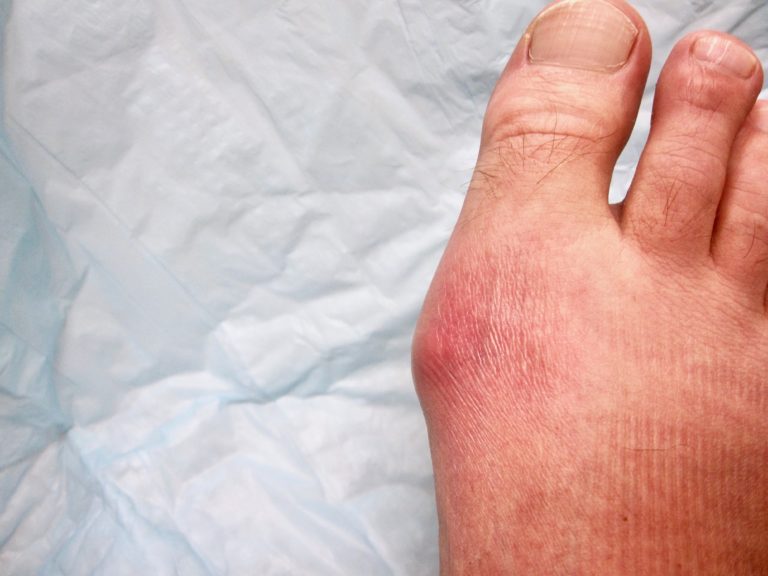Gout
Watch the video above to learn about Gout, and how I approach treating this with my patients. There's also more information below. As always, when you're ready, fill out the form on this page to request a consultation.
After surgery, I can do my normal thing. It has made my life come back to normal. You could not get a better doctor, podiatrist wise, than Dr. Stewart. — Jerry

Gout is an inflammatory arthritis that develops when uric acid, a breakdown product of purines, becomes crystallized inside of the joint. These uric acid crystals trigger an inflammatory process that leads to significant pain. Although gout can occur anywhere in the body, the foot and ankle, particularly the big toe joint, is a common location where gout presents.
Gout results from either overproduction of uric acid or from under excretion of uric acid by the kidneys. Certain foods like organ meats, shellfish, and game meats and drinks like beer are high in purines and can trigger gouty attacks.
Symptoms
Gout can cause both acute and chronic joint problems.
Acute gout is generally very rapid in onset. Patients generally go to sleep without symptoms and wake up in the middle of the night or 1st thing in the morning with intense pain and redness, swelling, and warmth to the affected joint. With a severe attack, patients have extreme difficulty walking and it hurts for the sheet of the bed to touch their foot.
When patients suffer repetitive attacks of gout in the same joint, the joint surfaces erode therefore leading to chronic, degenerative arthritic changes in the joint. These joints become stiff, swollen, and painful to move leading to increased morbidity.
Diagnosis
Gout is generally diagnosed on a clinical examination and by patient history. It is very common for patients to present with the classic symptoms of a red, hot, and swollen joint after indulging in beer or shellfish the night prior. The dietary history is very important when treating these patients. Furthermore, certain medications, particularly blood pressure medications, can cause gout attacks and therefore a careful review of the patient medication list is important when treating patients suspected of having gout.
Although the gold standard for diagnosing gout is to place a needle in the affected joint and try to pull out uric acid and identify it under a microscope, this is generally very difficult to perform, particularly in the small joints of the foot, and is not commonly performed.
Serum uric acid levels are frequently drawn and if high generally indicate that gout it present, but it is important to note that gouty attacks can occur with normal uric acid levels. Another commonly performed test is a 24-hour urine uric acid collection to see if patients are properly excreting uric acid.
Treatment
For patients suffering from an acute gouty attack, Dr. Stewart prefers to inject the affected joint with steroids. This directly treats the involved joint and avoids the side effects of the oral medications. If steroid injections are contraindicated, then oral anti-inflammatories and oral steroids as well as Colchicine are commonly used to treat gouty attacks.
I promise you if you are looking for an expert in his field, a doctor that truly cares, and a doctor that knows how to run a business then you need to contact Dr. Jordan Stewart – he is top of the line. – Susan McLean
Conservative treatment for Gout includes:
In order to prevent recurrent gouty attacks, oral medications such as Allopurinol, Colchicine, Uloric, and Probenecid can be used. The medication used to prevent gouty attacks is determined by whether or not the patient is overproducing or under excreting uric acid.
One of the mainstays of preventing recurrent gouty attacks is to follow a gout friendly diet. This includes limiting or avoiding beer, shellfish, and certain meats. Patients are instructed to learn about all of the foods that can cause gout and are instructed to avoid these foods.
Surgical treatment for Gout includes:
When patients have repetitive gouty attacks in a joint, the joints can become destroyed. This can lead to severe pain and disability. In cases where the symptoms are not relieved by conservative case, Dr. Stewart generally recommends surgery to fuse the joints affected by gout. Once the joint is fused, gout will no longer occur as the joint space has been eliminated.
